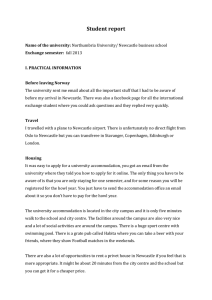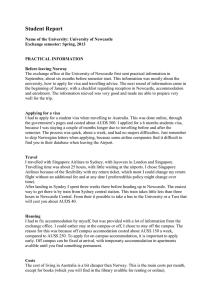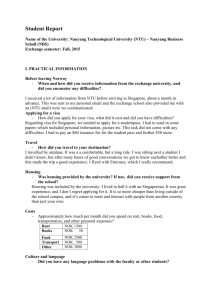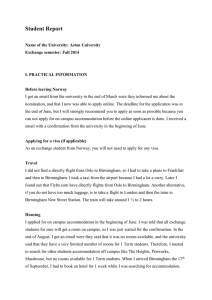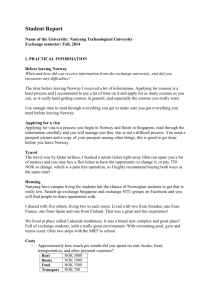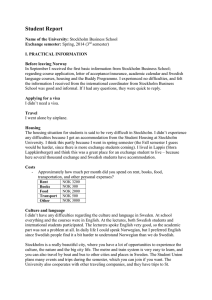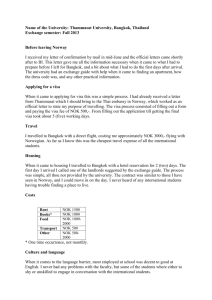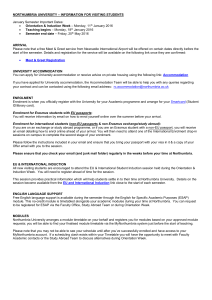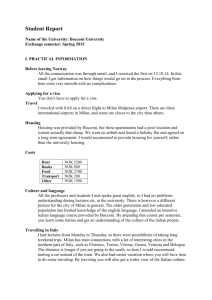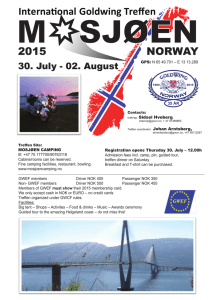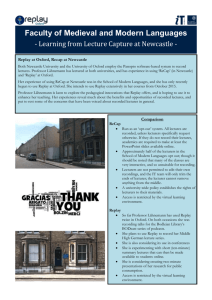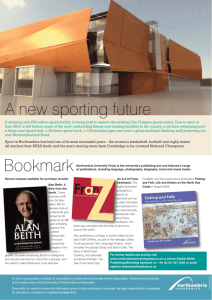Northumbria - Spring 2015 - BI Norwegian Business School
advertisement
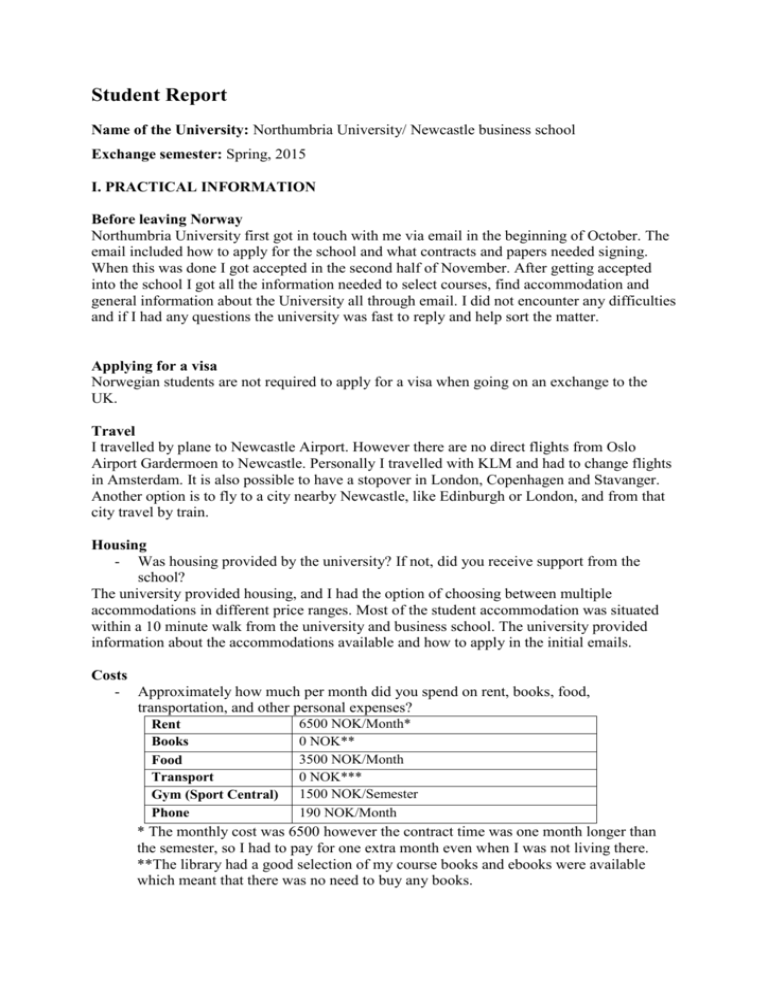
Student Report Name of the University: Northumbria University/ Newcastle business school Exchange semester: Spring, 2015 I. PRACTICAL INFORMATION Before leaving Norway Northumbria University first got in touch with me via email in the beginning of October. The email included how to apply for the school and what contracts and papers needed signing. When this was done I got accepted in the second half of November. After getting accepted into the school I got all the information needed to select courses, find accommodation and general information about the University all through email. I did not encounter any difficulties and if I had any questions the university was fast to reply and help sort the matter. Applying for a visa Norwegian students are not required to apply for a visa when going on an exchange to the UK. Travel I travelled by plane to Newcastle Airport. However there are no direct flights from Oslo Airport Gardermoen to Newcastle. Personally I travelled with KLM and had to change flights in Amsterdam. It is also possible to have a stopover in London, Copenhagen and Stavanger. Another option is to fly to a city nearby Newcastle, like Edinburgh or London, and from that city travel by train. Housing - Was housing provided by the university? If not, did you receive support from the school? The university provided housing, and I had the option of choosing between multiple accommodations in different price ranges. Most of the student accommodation was situated within a 10 minute walk from the university and business school. The university provided information about the accommodations available and how to apply in the initial emails. Costs - Approximately how much per month did you spend on rent, books, food, transportation, and other personal expenses? Rent Books Food Transport Gym (Sport Central) Phone 6500 NOK/Month* 0 NOK** 3500 NOK/Month 0 NOK*** 1500 NOK/Semester 190 NOK/Month * The monthly cost was 6500 however the contract time was one month longer than the semester, so I had to pay for one extra month even when I was not living there. **The library had a good selection of my course books and ebooks were available which meant that there was no need to buy any books. *** There is no need to use any form of transportation on a day-to-day basis, as the city is relatively small. Culture and language I had no difficulties with the language, as English was the primary language at the University. Even though the students were from all over the world the university has language requirements that makes sure that students speak relatively good English. It is easy to travel around England by train, bus and even plane. The student union at the University did arrange daytrips to nearby cities and places, however information about the trips is not widely available and the easiest is to make an enquiry to the student union directly. II. ABOUT THE SCHOOL Please describe: - The school (location, size, study structure, special academic areas etc.) The city campus where the business school is located is about a ten minute walk from city’s the main street. As a business student all classes are held in the business school, making it easy to get from one class to another. The library is located on the other side of the city campus, however the campus is of a manageable size and it takes around five minutes to walk from one side to the other. Course registration After being accepted into the university I received an email explaining how to apply for the different courses. A list of modules/courses is available on the university website and I was asked to make a prioritize list of 10 modules I was interested in taking. This list was sent back to the university by email. - When did the add/drop period end? The final course list was available at the online student portal of the university when the timetable was available. This was available a few days before the semester started. Academic calendar Arrival date: First day of the semester: Last day of classes: Examination period: Any special events/holidays: 10.01.15 19.01.15* 01.05.15 05.05.15-22.05.15 13.03.15 – 17.04.15** * Whilst the official lectures started on the 19th, the introduction week started on the 12th of January. ** Easter holiday/spring break. Arrival The introduction week at Northumbria was mostly focused on the courses and the academic part of the exchange. Every day we had a few hours of introduction into different parts of the university and what is expected with the other international students at our program. There was also a campus tour for international students from all programs at the university. As the introduction week was very focused on the academic aspects, the social part was not as well taken care of as I would have hoped. This means that everyone actively have to engage with the other international students in order to get to know new people. The International Office I received all the information I needed from the international office and the office in the business school. If I had a question it was easy to stop by and ask or send an email. Social activities As my exchange was in the second semester of the second year most of the native students already had their group of friends and where therefor not that interested in getting to know international students. I did however have some group work with native students and they were very open and nice during this. The exchange students are a lot more open to make new friends and they are easy to get to know. We became a group of around 40 exchange students that had a great time together in Newcastle. There are not any organisations or organisations specifically catered to exchange students. However Newcastle is a student city and there is always a lot going on, the student union have different events and the city in general is student friendly. III. ACADEMICS In the classroom The teaching style of Northumbria University is somewhat different to the teaching style at BI. In each course the norm is to have two lectures, similar to the ones at BI, and one seminar a week. Most lectures and seminars last for one hour. In lectures there are usually more students than in seminars. Seminars are more informal than lectures, and consist of group work, presentations and other tasks, although these do normally not count towards the final mark in the course. This is an opportunity to get feedback from the seminar leaders as well as more personal help in the course. - How is the level and workload compared to that at BI? I had the opportunity to choose from two different levels of courses. The ones I choose was however at approximately the same level as the ones at BI. The workload was also relatively the same as it is expected that students work outside of lectures and prepare for seminars. Course materials - Describe the course materials used The course material is very similar to what is used at BI. The lecturers use powerpoint for their presentations. These are closely connected to the books and articles that are included in the course material. In seminars case studies are often used for a more practical approach to the course than the lectures. Exams The exams and assignments were based on both course material and lectures. Even though group work and presentations are common in seminars these are usually not compulsory and does not count towards the final mark in the course. Most courses at Northumbria University are evaluated by home assignments. Some courses however have written exams and/or group work that count for some or all of the mark in the course. Library and technology The facilities are not as nice as BI, but they are definitely sufficient. The library is relatively big and spacious with team working zones, silent rooms and normal computer rooms. There were a lot of computers available, as it seems that just a minority brings their own laptops. However in the assessment period it could be hard to find a free spot in the library. The library had a good selection of books and other course material and an easy system for taking books home was in place using only the student card and a personal code to be able to borrow books. Description of courses Course code & name MO0256 Transport and Inventory Management Bachelor Bachelor Exam form Written home assignment (100%) Approved as Logistics MK0273 Markets and Customers Bachelor Group work (20%) 2-hour exam (80%) Elective MK0274 Marketing Communications Bachelor Written home assignment (100%) Elective Comments Recommended course. Enthusiastic lecturer. Very interesting and with a more practical approach to marketing. A good marketing course with a broad range of subjects. Sum up the exchange experience The exchange has been an amazing experience that I will never forget. It has changed my approach to new situations and meeting new people. I have experienced different cultures, both the English and the cultures of all the amazing exchange students I have met. My English and most of all my confidence in speaking English have improved tremendously. This has been an experience I would not be without and I have made friends for a lifetime.
